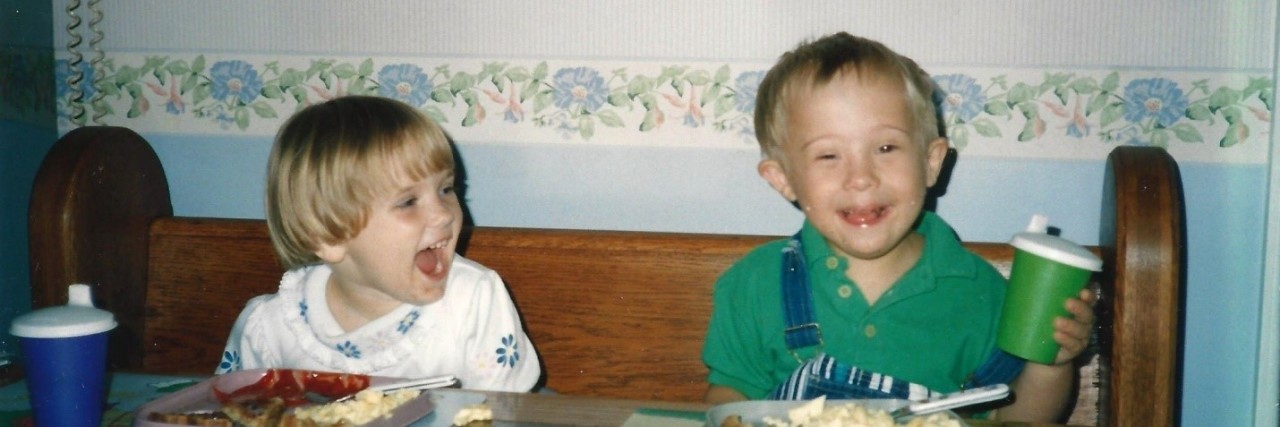“Phillip! Where’s my toothbrush?” This is something you may hear me yell in the morning when I go home to visit my family for the weekend. Phillip likes to keep the counter tops clean and clear. When you look at him and see he has Down syndrome, you might not know he has OCD. Unlike Down syndrome that can be seen in his physical characteristics, OCD is invisible.
Phillip’s Down syndrome is visibly obvious. I’ve even been asked, “Aww, he’s so cute! What’s his name?” I appreciate people acknowledging him, but:
1. He’s not a puppy.
and
2. He’s 27 years old. Would they talk to a typical 27-year-old like that?
Visible disabilities lead to many generalizations. For example, when we were kids, it was awesome to be sent to the front of a long line at an amusement park. All amusement parks I have experienced have been very accommodating, which I am so appreciative of. But, it’s important not to generalize that all kids that you can visibly tell have Down syndrome would have a hard time waiting in lines. Obviously, as a little sister, that situation was highly ideal though.
Although, I would often feel self-conscious when we would go out in the local community. I am ashamed for having had these thoughts, but going out to a restaurant was sometimes uncomfortable for me. I just didn’t like people staring at my brother. I also didn’t want people feeling bad for my family. I didn’t want pity because I knew how much our family rocked! As an adult, I now realize people were not always looking at us with judgmental eyes, but rather with adoration and genuine interest.
I worried about things like, “What if he has a sit-down strike?” or “What if the waiter gets frustrated when he asks what he wants to eat and doesn’t get an instant reply?” Does he get a “free pass” from the general eye because it’s visibly clear he has Down syndrome? This leads me to talk about his other invisible disability. You cannot look at Phillip and see that he is on the autism spectrum, too. There are no physical features that would make someone say “that person has autism” when looking at photograph.
Some positive generalizations people make of people with Down syndrome are that they are happy, lovable and outgoing. I don’t like to stereotype, but without the visible features of Down syndrome, would people think Phillip is not any of those things? The Phillip I know is all those things and more.
When some people glance at Phillip, they may think, “Oh, I get it.” But do those people “get it” with his invisible disabilities just as easily? In the experiences with my brother, the invisible disabilities have been more challenging to explain than the visible ones. It was not a quick and easy conversation explaining to our house guests why their toothbrushes went missing!
We accommodate and respect Phillip’s invisible disabilities the same way we do with his visible ones.
I strive to bring awareness, acceptance and inclusiveness to invisible disabilities.
P.S. The secret hiding spot for my toothbrush is in back of the middle drawer under the sink. But shhh, don’t tell Phillip I know.

